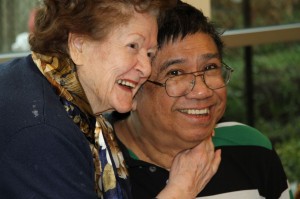 The New York Times reported on a phenomenon experienced by many people called Emotional Contagion. In this article, Judith Graham writes: “The term refers to the way we sense the emotions of others through their facial expressions, tone of voice or body language, and reflect them without being conscious of doing so.” New research published finds that emotional contagion is intensified in people with cognitive impairment. There are 10 things you can do to turn this into a useful tool.
The New York Times reported on a phenomenon experienced by many people called Emotional Contagion. In this article, Judith Graham writes: “The term refers to the way we sense the emotions of others through their facial expressions, tone of voice or body language, and reflect them without being conscious of doing so.” New research published finds that emotional contagion is intensified in people with cognitive impairment. There are 10 things you can do to turn this into a useful tool.
“A great deal of what our higher-order cognitive function does is inhibit or modulate our lower-level responses,” says Dr. Wint, director of educations programs at the Cleveland Clinic’s Lou Ruvo Center for Brain Health. In other words, when we are calm and centered, someone with dementia will pick that up. The same if we are anxious or rushing. They will pick that up and begin to shut down.
Dr. Allan Powers, author of Dementia Beyond Drugs, offers a suggestion to try if you are with someone and becoming frustrated. Try stopping and counting to 10, think of a positive quality they have and focus on that. And there are some other things you can try as well. It’s an inside job for sure. Read on….
In with Encouragement, Out with Judgement
Rather than having to decide if an opinion or a behavior is ‘good’ or ‘bad’, think of your job as one to simply being present without judgement. A simple and effective way to do this is to practice ‘Unconditional Positive Regard’.1 In his book, A Way of Being, Rogers (1980) states, “As persons are accepted and prized, they tend to develop a more caring attitude towards themselves” (p. 166).2
Why is valuing someone more important than liking them?
I say, in with encouragement, out with judgement. But that’s easy to do with people we like and somewhat harder with people we don’t like much. It is easy to like the people we like. Those that work hard, are friendly and get along with others, like the same things we do—we are conditioned to like them. Everyone is human and it is not likely that we ‘like’ everyone whether they are people we work with or work for. In some ways, how we are around those we care for is conditional. Valuing each person as someone of worth, however is unconditional. Valuing someone is even more powerful and loving than ‘liking’ them. Why? Because it does not make demands on them to be like us or to meet our needs.3
Everyone will have their own way of communicating unconditional positive regard. Here are some 10 simple suggestions adapted from Mearns and Thorne (1999) :
- Being present and attentive
- Going over to the person and greeting them – be the first
- Shaking hands with them
- Using their first name
- Smiling (be authentic, be who you are)
- Using a warm tone of voice
- Holding eye contact
- Showing genuine interest in what they say
- Offering a hug or touching their arm/shoulder
- Suspending judgement
References
1Rogers, Carl. (1951). Client-centered Therapy: Its Current Practice, Implications and Theory. London: Constable.
2Rogers, Carl. (1980). A Way of Being. Boston: Houghton Mifflin.
3Mearns, D. and Thorne, B. (1999). Person-Centred Counselling in Action. (Second Edition). London: Sage Publications.
